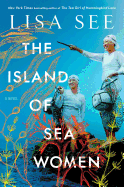
For centuries, the women of Jeju, an island off the south coast of Korea, made their living as haenyeo, deep-sea divers. Working in small groups, they trained from their youth to harvest the "sea-fields" and provide food and income for their families, while their husbands remained at home. Lisa See (China Dolls, The Tea Girl of Hummingbird Lane) explores the effects of political upheaval and massive technological changes in the 20th century on the haenyeo in her seventh historical novel, The Island of Sea Women.
See begins her narrative in the 1930s, as two young girls, Kim Young-sook and Han Mi-ja, begin their training as haenyeo. Young-sook is the daughter of the local diving chief, Mi-ja the neglected child of a Japanese collaborator. But the girls become friends and learn the skills of diving together, navigating the physical strain and emotional losses of their work. Their story continues through their years of diving, marriage and motherhood, as World War II and other conflicts bring new politics, new technologies and new ideas to their island.
See uses brief flash-forward scenes set in 2008, when Young-sook is an old woman, to hint at a longstanding break between the two friends. Gradually, the two narratives bend toward one another, revealing the layers of Young-sook's grief and the incident that ended her friendship with Mi-ja. Along the way, See paints a vivid portrait of family life on Jeju, charts the atrocities the islanders experienced under Japanese occupation and asks whether forgiveness is possible, for people and for communities.
Meticulously researched and rendered in Young-sook's compelling voice, See's novel is a fascinating glimpse into a little-known culture and a powerful exploration of loss and healing. --Katie Noah Gibson, blogger at Cakes, Tea and Dreams

